|
|
|
Sort Order |
|
|
|
Items / Page
|
|
|
|
|
|
|
| Srl | Item |
| 1 |
ID:
159037
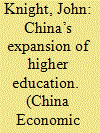

|
|
|
|
|
| Summary/Abstract |
In the decade 1998–2008 China expanded enrolment in higher education almost six-fold. For the examination of its short term labour market consequences, this unprecedentedly huge and sudden policy change might be regarded as a natural experiment. After providing a theoretical framework for analysis, the paper uses urban labour market surveys to analyse how the labour market adjusted to the supply shock. Three outcomes are examined: the effect of the expansion on wages, on unemployment, and on access to ‘good jobs’. The shock is found to reduce relative wages, raise the unemployment rate, and reduce the proportion in good jobs, but only for the entry-year or entry-period cohort of graduates. The effect is fairly powerful for entrants, especially university rather than college graduates, but incumbent graduates are largely protected from the supply shock. An attempt is made to examine the labour market effects of the quantitative expansion on educational quality. The paper provides insight into the operation of China's labour market in recent years.
|
|
|
|
|
|
|
|
|
|
|
|
|
|
|
|
| 2 |
ID:
114513
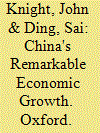

|
|
|
|
|
| Publication |
Oxford, Oxford University Press, 2012.
|
| Description |
xvii, 336p.Hbk
|
| Standard Number |
9780199698691
|
|
|
|
|
|
|
|
|
|
|
|
Copies: C:1/I:0,R:0,Q:0
Circulation
| Accession# | Call# | Current Location | Status | Policy | Location |
| 056778 | 338.951/KNI 056778 | Main | On Shelf | General | |
|
|
|
|
| 3 |
ID:
120620
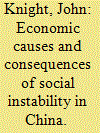

|
|
|
|
|
| Publication |
2013.
|
| Summary/Abstract |
This paper provides a survey of the economic literature relevant to social instability in China and moulds it into an argument. The objective is to offer a fresh view of economic policy and performance through the lens of the threat posed by social instability. This is a concept that economists rarely analyse, and yet it can lurk behind much economic policy-making. China's leadership has often publicly expressed its concern to avoid 'social instability'. It is viewed as a threat both to the political order and to the continued rapid growth of the economy. This threat to growth in turn endangers the maintenance of social stability. The paper examines the likely economic determinants of social instability, using both surveys and other evidence. After discussing the determinants of China's rapid growth, the paper goes on to examine the likely mechanisms by which social instability can affect the growth rate. There is a case for more research on the role of social instability in the economic development process.
|
|
|
|
|
|
|
|
|
|
|
|
|
|
|
|
| 4 |
ID:
130978
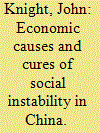

|
|
|
|
|
| Publication |
2014.
|
| Summary/Abstract |
China's leaders have often expressed concerns about social instability, viewed as a threat both to the political order and to continued rapid growth. Slower growth might, in turn, further undermine social stability. Using survey data, the present paper examines the economic determinants of social instability. Four main determinants are identified: past and expected growth of income, income inequality, economic insecurity and misgovernance. The paper then considers possible policies to reduce social instability, examining each of the determinants in turn.
|
|
|
|
|
|
|
|
|
|
|
|
|
|
|
|
| 5 |
ID:
130977
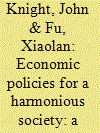

|
|
|
|
|
| Publication |
2014.
|
| Summary/Abstract |
China's remarkable economic growth has produced dramatic structural and socioeconomic change.
Economic growth has solved many problems but the accompanying changes in the economy and
society have brought new problems to the fore. This has been recognized by China's Government
in the recent emphasis that it has placed on the need to create a "harmonious society." The new
leadership will wish to devise new policies for the current challenges and those ahead
|
|
|
|
|
|
|
|
|
|
|
|
|
|
|
|
| 6 |
ID:
073500
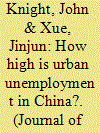

|
|
|
|
|
| Publication |
2006.
|
| Summary/Abstract |
Rapid economic growth and radical structural transformation pose a challenge to official statisticians as they seek to encompass new economic activities and phenomena. The accuracy of official statistics is liable to come into question. Urban unemployment in China is a good example. This paper estimates the urban unemployment rate using administrative statistics, population census data and a recent sample survey data set, and provides a critique showing in some detail how and why Chinese unemployment statistics are a minefield for the unwary and unemployment is so difficult to measure. Nevertheless, it is found that the urban unemployment rate rose rapidly over the 1990s and exceeded 11% in 1999 and 2000. The paper concludes by considering the implications of the findings for understanding unemployment, for policy, and for the collection of statistics.
|
|
|
|
|
|
|
|
|
|
|
|
|
|
|
|
| 7 |
ID:
187843
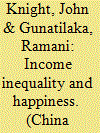

|
|
|
|
|
| Summary/Abstract |
The effect of inequality on happiness should intrigue social scientists. Of the many dimensions of income inequality, we explore four, analysing a rich data set for China. Does actual or perceived inequality have a greater effect on happiness? We find that perceptions of inequality are the more important. How broad is the reference group with which people compare themselves? They report that it is narrow; and indeed narrowly defined inequality has the greater effect on happiness. Do perceptions of the degree of fairness of inequality matter? They do, as they ameliorate the adverse effect of inequality on happiness, especially for the poorest. Is it self-centred or community-based inequality which affects happiness? Both measures have significant effects, but in opposite directions. The research and policy implications are discussed.
|
|
|
|
|
|
|
|
|
|
|
|
|
|
|
|
| 8 |
ID:
110504
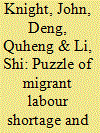

|
|
|
|
|
| Publication |
2011.
|
| Summary/Abstract |
The paper examines the contentious issue of the extent of surplus labour that remains in China. China was an extreme example of a surplus labour economy, but the rapid economic growth during the period of economic reform requires a reassessment of whether the second stage of the Lewis model has been reached or is imminent. The literature is inconclusive. On the one hand, there are reports of migrant labour scarcity and rising migrant wages; on the other hand, estimates suggest that a considerable pool of relatively unskilled labour is still available in the rural sector. Yet the answer has far-reaching developmental and distributional implications. After reviewing the literature, the paper uses the 2002 and 2007 national household surveys of the Chinese Academy of Social Sciences to analyse and explain migrant wage behaviour, to predict the determinants of migration, and to examine the size and nature of the pool of potential rural-urban migrants. An attempt is also made to project the rural and urban labour force and migration forward to 2020, on the basis of the 2005 1% Population Survey. The paper concludes that for institutional reasons both phenomena are likely to coexist at present and for some time in the future.
|
|
|
|
|
|
|
|
|
|
|
|
|
|
|
|
| 9 |
ID:
092530


|
|
|
|
|
| Publication |
2009.
|
| Summary/Abstract |
A national household survey for 2002, containing a specially designed module on subjective well-being, is used to estimate pioneering happiness functions in rural China. The variables that are predicted by economic theory to be important for happiness prove to be relatively unimportant. Our analysis suggests that we need to draw on psychology and sociology if we are to understand. Rural China is not a hotbed of dissatisfaction with life, possibly because most people are found to confine their reference groups to the village. Relative income within the village and relative income over time, both in the past and expected in the future, are shown to be important for current happiness, whereas current income is less so. Even amidst the poverty of rural China, attitudes, social comparisons and aspirations influence subjective well-being. The implications of the findings for the future and for policy are considered.
|
|
|
|
|
|
|
|
|
|
|
|
|
|
|
|
|
|
|
|
|